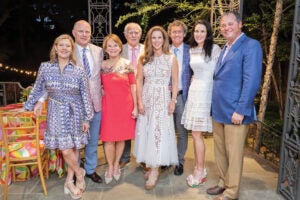AUSTIN, Texas—The University of Texas at Austin will deliver an orange accolade to the School of Law team that was crowned national champion in the recent National Student Trial Advocacy Competition (STAC) by lighting The University of Texas Tower on Monday evening (April 19).
Special lightings of the entire 27-story Tower in the school color of orange are reserved for occasions of great distinction in the life of the University, as determined by the president, and for such precipitous events as a national sports title.
STAC, sponsored by the American Trial Lawyers Association (ATLA), is considered the premier competition of its type in the nation, with teams from 186 schools competing. UT, which captured the title for the first time, had two teams in the event. Both won at the regional meet in Kansas City without losing a round, setting a new ATLA record. These victories qualified both teams for the national competition in New Orleans.
UT’s championship team was made up of John Scott Black of Houston, Jennifer Britton of Austin, Kathy Silver of Houston and Rex Zgarba of Austin. The second team, which finished fifth in the national round, consisted of Brad Benoit of Baytown, Angela Hahn of Austin, Stephen Foster of Austin and Rebecca Kimmel of Austin. Mariam Uddin was the alternate for both teams. Robert May, a 1992 UT law graduate, coached both teams pro bono, while compiling a record of 34 wins and six losses.
“The law school places great value on honing the advocacy skills of our students,” said M. Michael Sharlot, dean of the School of Law. “We are enormously proud of their exceptional achievement in this competition.”
One of ATLA’s goals is to inspire excellence in trial advocacy through training and education for both law students and practicing attorneys. One way ATLA accomplishes that goal is by sponsoring the National Student Trial Advocacy Competition, an annual nationwide mock trial competition.
Unlike moot court competitions in which students argue points of law to an appellate court, mock trial competitions simulate civil trials. Mock trial students work in teams, much as they would on a complex case in a real court, and competitions are structured so that each team represents both sides of a case. Teams are coached by practicing litigators.
Law schools may enter one or two teams, each team consisting of four law students. Teams are assigned to one of 12 regional competitions located across the country. Each team competes in three qualifying rounds, after which the top eight teams are selected to advance to a single elimination quarterfinal round. The top four teams then compete in a single elimination final round. The top two teams from each region advance to the national finals approximately three weeks after the regional competition.
The national finals are organized in the same fashion; three qualifying rounds, a single elimination quarterfinal round, a single elimination semi-final round and a final round.
STAC cases tend to deal with products liability, personal injury or medical malpractice/negligence issues. Teams are judged on their skills in case preparation, opening statements, use of facts, the examination of lay and expert witnesses and closing arguments.
The University of Texas law school is a nationally recognized and award-winning center of training in trial advocacy. The school’s physical facilities for the teaching of advocacy and dispute resolution will be dramatically enhanced by the addition of the John B. Connally Center for the Administration of Justice, which will house a large, fully functional courtroom — with judicial chambers, jury deliberation rooms, attorney conference rooms and a number of teaching courtrooms. The completion of this building, expected in fall 1999, will give the law school perhaps the best facility for the teaching of advocacy in the United States.



